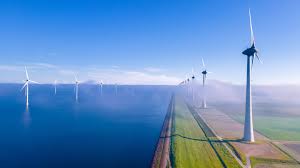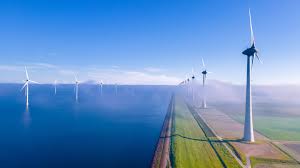
The industry claimed that Britain's temporary revenue cap on low-carbon electricity producers was a "de facto windfall tax" on sources of renewable energy.
The government is looking for ways to stop the skyrocketing cost of energy while also raising money to help pay for tax cuts, despite the new prime minister Liz Truss' declaration last month that she opposed imposing windfall taxes on businesses.
Following Russia's invasion of Ukraine, gas prices have skyrocketed throughout Europe and Great Britain, which has in turn raised the price of electricity.
The new plan would apply to low-carbon generators that sell their power at those high prices but do not need to buy expensive fuel since gas typically sets the price of electricity.
"Low-carbon electricity generators are therefore benefiting from abnormally high prices, while consumers are having to pay significantly more for energy generated from renewables and nuclear, even though they often cost less to produce," the Department for Business, Energy and Industrial Strategy (BEIS) said.
The "Cost-Plus-Revenue Limit" is a component of a larger energy support program unveiled by Truss last month, which also included a cap on the cost of monthly energy bills for the typical household.
Early this year, British lawmakers approved a 25% windfall tax on British North Sea oil and gas producers.
The package, known as The Energy Prices Bill, was introduced in parliament on Tuesday. It grants the government new emergency powers to implement the ideas.
Britain's action is in line with similar initiatives in Europe, where the European Commission has suggested capping the price at 180 euros ($175) per megawatt hour (MWh) for the power produced by these renewable sources of generation.
Britain's cap, according to RWE UK Country Chair Tom Glover, is a "de-facto windfall tax on low-carbon generators."
The move, according to British Business and Energy Minister Jacob Rees-Mogg, is intended to address the disparity in the profits that some power generators can realize as a result of the country's electricity market's structure.
"It is not a windfall tax, it's clearly not a tax. It's nothing to do with the profits these companies are making," he said speaking on BBC radio on Wednesday
Power producers emphasized that the measure could have an impact on investment in new projects if it is poorly designed.
"Any revenue cap must be set at a level that doesn’t discourage essential investment in the UK’s renewable energy sector and therefore should be comparable to other countries, particularly given the 180 euro cap being implemented by the EU," a spokesperson for SSE said.
On the anticipated revenue price cap for the British program, which would apply to generators in England and Wales, no information was provided.
The temporary "Cost-Plus Revenue Limit" will go into effect at the beginning of 2023, according to BEIS, and before announcing specifics on how it will operate, the agency will consult with industry.
Additionally, the government declared that it would introduce legislation to give it the authority to think about launching a voluntary Contracts-for-Difference (CfD) process for current low-carbon generators in 2023.
The government's primary tool for promoting low-carbon electricity production is the CfD program.
According to the government, a voluntary contract would give generators longer-term revenue certainty and protect consumers from further price increases.
This, according to RWE's Glover, is the most effective and investor-friendly method of separating the price of electricity from the marginal price of gas.
(Source:www.latestly.com)
The government is looking for ways to stop the skyrocketing cost of energy while also raising money to help pay for tax cuts, despite the new prime minister Liz Truss' declaration last month that she opposed imposing windfall taxes on businesses.
Following Russia's invasion of Ukraine, gas prices have skyrocketed throughout Europe and Great Britain, which has in turn raised the price of electricity.
The new plan would apply to low-carbon generators that sell their power at those high prices but do not need to buy expensive fuel since gas typically sets the price of electricity.
"Low-carbon electricity generators are therefore benefiting from abnormally high prices, while consumers are having to pay significantly more for energy generated from renewables and nuclear, even though they often cost less to produce," the Department for Business, Energy and Industrial Strategy (BEIS) said.
The "Cost-Plus-Revenue Limit" is a component of a larger energy support program unveiled by Truss last month, which also included a cap on the cost of monthly energy bills for the typical household.
Early this year, British lawmakers approved a 25% windfall tax on British North Sea oil and gas producers.
The package, known as The Energy Prices Bill, was introduced in parliament on Tuesday. It grants the government new emergency powers to implement the ideas.
Britain's action is in line with similar initiatives in Europe, where the European Commission has suggested capping the price at 180 euros ($175) per megawatt hour (MWh) for the power produced by these renewable sources of generation.
Britain's cap, according to RWE UK Country Chair Tom Glover, is a "de-facto windfall tax on low-carbon generators."
The move, according to British Business and Energy Minister Jacob Rees-Mogg, is intended to address the disparity in the profits that some power generators can realize as a result of the country's electricity market's structure.
"It is not a windfall tax, it's clearly not a tax. It's nothing to do with the profits these companies are making," he said speaking on BBC radio on Wednesday
Power producers emphasized that the measure could have an impact on investment in new projects if it is poorly designed.
"Any revenue cap must be set at a level that doesn’t discourage essential investment in the UK’s renewable energy sector and therefore should be comparable to other countries, particularly given the 180 euro cap being implemented by the EU," a spokesperson for SSE said.
On the anticipated revenue price cap for the British program, which would apply to generators in England and Wales, no information was provided.
The temporary "Cost-Plus Revenue Limit" will go into effect at the beginning of 2023, according to BEIS, and before announcing specifics on how it will operate, the agency will consult with industry.
Additionally, the government declared that it would introduce legislation to give it the authority to think about launching a voluntary Contracts-for-Difference (CfD) process for current low-carbon generators in 2023.
The government's primary tool for promoting low-carbon electricity production is the CfD program.
According to the government, a voluntary contract would give generators longer-term revenue certainty and protect consumers from further price increases.
This, according to RWE's Glover, is the most effective and investor-friendly method of separating the price of electricity from the marginal price of gas.
(Source:www.latestly.com)














